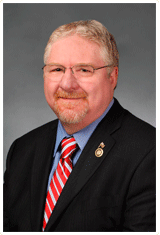The Senate Jobs, Economic Development and Local Government Committee, on which I sit, considered a number of important bills this week, including legislation I’ve sponsored to resolve a problem regarding Greene County’s 911 Advisory Board.
The Greene County 911 Advisory Board, responsible for overseeing the county’s emergency services, has always been under the control of the County Commission, with members appointed to the board. It’s a good setup, and it’s worked fine for years.
However, an amendment to a statute might or might not require this advisory board to become a separate political subdivision. Instead of working under Greene County, the board would be forced to establish its own accounting, budgeting, purchasing, asset tracking, and contracting systems. It would also have to hold elections. All this equals more money, an incredible burden on local budgets, which are already stretched thin.
As heard during the committee hearing, Senate Bill 690 would simply establish in law the current setup of the Greene County 911 Advisory Board. If in the future the board decides it is in citizens’ best interest to become separate, it can also do that under the bill. It’s an even-handed fix to a problem affecting us locally.
The committee also conducted a hearing on a bill aimed at ending the ongoing economic “border war” between Missouri and Kansas. For years, the two states have fought to bring businesses to their region, especially in the Kansas City area. Missouri alone has spent millions in incentives to keep companies in the state. Kansas has done the same.
It’s cost both states valuable taxpayer dollars, and the only real result has been companies hopping back and forth across the state line to take advantage of whatever incentive is best at the time. This isn’t creating jobs; it’s just shuffling them, and at a high cost to taxpayers. It’s time we stopped wasting valuable economic development funds for businesses that are taking advantage of state efforts to improve their economies.
Senate Bill 635 would prohibit the issuance of tax credits to businesses relocating from certain counties in Kansas if the state also enacts a similar prohibition. While this legislation does require the cooperation of Kansas officials, it is one of the best solutions we’ve seen in some time to finally ending a very costly issue.
The Financial and Governmental Organizations and Elections Committee, which I chair, considered this week the House version of a Senate measure that evens the playing field for citizens who choose to run for elected office.
It’s commonly believed that the order names are listed on a ballot affects voting results. To account for that potential bias, we make citizens who file for candidacy draw numbers to determine ballot placement. After that, names are placed in the order candidates register.
Those who file by mail because of a disability or service in the military, however, aren’t allowed to draw numbers. Instead, they’re placed in the order of their filing. This can put those candidates at a serious disadvantage, for no other reason than they’re physically unable to file in person.
Senate Bill 630 and House Bill 1125 would allow representatives for the candidates to draw numbers for ballot placement. It’s a simple change that could improve the ability of military members and citizens with disabilities to take part in the creation of public policy through elected office.
Additionally, the committee approved a measure aimed at implementing some much-need consumer protections in the payday loan industry. These businesses offer short-term loans, often to people who have nowhere else to go. When a customer is unable to pay that loan, it’s then rolled over, or renewed. People often get trapped in a cycle of debt, and it becomes nearly impossible to get out of it. Sadly, it’s often low-income residents who fall victim to these loans, the very people who can least afford to.
Senate Bill 694 would prohibit the majority of these predatory practices. The bill prohibits payday loan companies from renewing any loans and establishes an extended payment plan for individuals with outstanding loans. Their loan would be broken into four equal payments. If the borrower pays off the full amount within 60 days, no interest would accrue.
If you have any questions or comments about this or any other matter regarding your state government, please feel free to contact me at (573) 751-1503; you are also welcome to e-mail me at jay.wasson@senate.mo.gov. |



